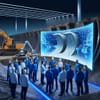Artificial intelligence (AI) is transforming tunnel engineering by enhancing predictive accuracy, optimizing construction strategies, and improving safety. Machine learning models, such as Gradient Boosting Machines (GBM) and Deep Q-Networks, can predict environmental impacts and construction risks with high accuracy. These models can identify optimal tunnel construction strategies, reducing environmental impact while maintaining safety and efficiency.
One of the key applications of AI in tunnel engineering is predicting Tunnel Boring Machine (TBM) performance, enabling more efficient tunnel excavation. AI models can also predict surface settlement, crucial for safeguarding local infrastructure and soil quality. Additionally, AI-powered computer vision can quickly monitor and diagnose tunnel diseases, such as cracks and structural damage.
The benefits of AI in tunnel engineering are numerous. AI-driven automation enhances safety by expediting tasks like surveying, material handling, and excavation, minimizing errors and accidents. AI optimizes resource utilization, reducing construction timelines and costs. Furthermore, AI promotes sustainable infrastructure development by minimizing ecological impact and ensuring long-term durability.
As AI continues to evolve, it is likely to have a significant impact on the future of tunnel engineering, enabling organizations to build safer, more efficient, and more sustainable tunnels. By leveraging AI and machine learning, tunnel engineers can improve predictive accuracy, reduce risks, and optimize construction strategies, ultimately leading to better outcomes for infrastructure projects.


